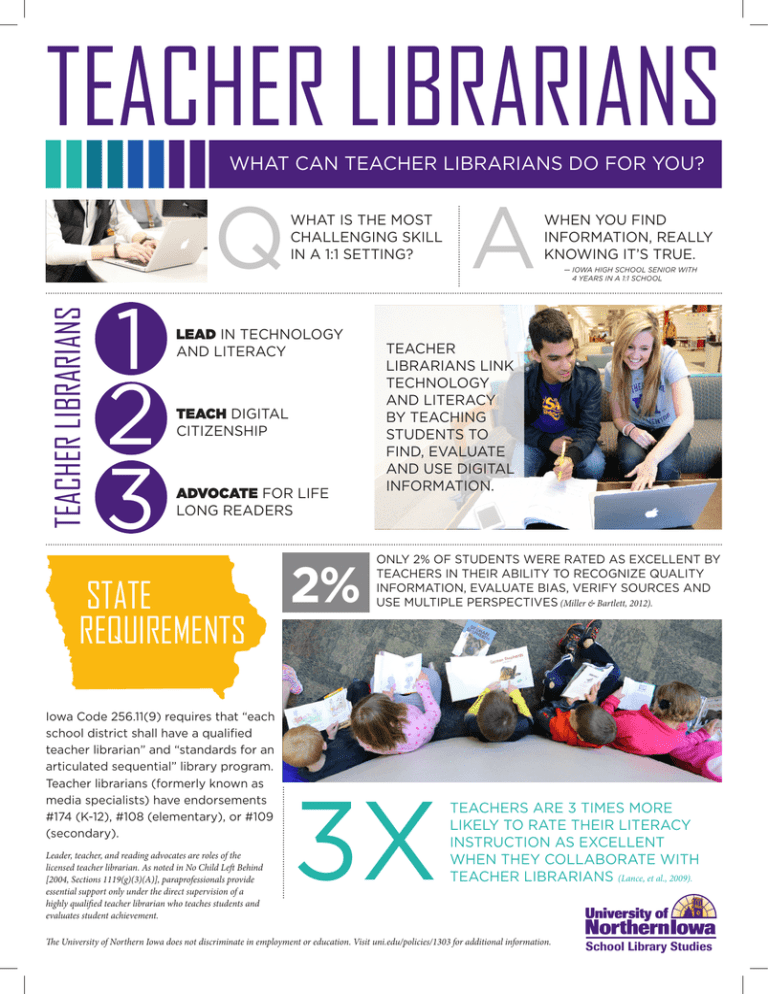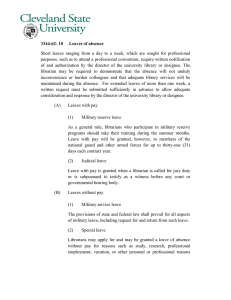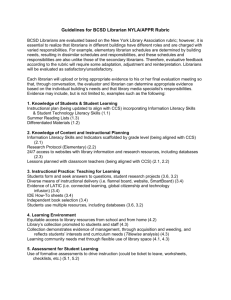TEACHER LIBRARIANS Q A 1
advertisement

TEACHER LIBRARIANS TEACHER LIBRARIANS WHAT CAN TEACHER LIBRARIANS DO FOR YOU? 1 2 3 Q WHAT IS THE MOST CHALLENGING SKILL IN A 1:1 SETTING? LEAD IN TECHNOLOGY AND LITERACY TEACH DIGITAL CITIZENSHIP ADVOCATE FOR LIFE LONG READERS STATE REQUIREMENTS Iowa Code 256.11(9) requires that “each school district shall have a qualified teacher librarian” and “standards for an articulated sequential” library program. Teacher librarians (formerly known as media specialists) have endorsements #174 (K-12), #108 (elementary), or #109 (secondary). Leader, teacher, and reading advocates are roles of the licensed teacher librarian. As noted in No Child Left Behind [2004, Sections 1119(g)(3)(A)], paraprofessionals provide essential support only under the direct supervision of a highly qualified teacher librarian who teaches students and evaluates student achievement. 2% A WHEN YOU FIND INFORMATION, REALLY KNOWING IT’S TRUE. — IOWA HIGH SCHOOL SENIOR WITH 4 YEARS IN A 1:1 SCHOOL TEACHER LIBRARIANS LINK TECHNOLOGY AND LITERACY BY TEACHING STUDENTS TO FIND, EVALUATE AND USE DIGITAL INFORMATION. ONLY 2% OF STUDENTS WERE RATED AS EXCELLENT BY TEACHERS IN THEIR ABILITY TO RECOGNIZE QUALITY INFORMATION, EVALUATE BIAS, VERIFY SOURCES AND USE MULTIPLE PERSPECTIVES (Miller & Bartlett, 2012). 3X TEACHERS ARE 3 TIMES MORE LIKELY TO RATE THEIR LITERACY INSTRUCTION AS EXCELLENT WHEN THEY COLLABORATE School LibraryWITH Studies TEACHER LIBRARIANS (Lance, et al., 2009). The University of Northern Iowa does not discriminate in employment or education. Visit uni.edu/policies/1303 for additional information. School Library Studies TEACHER LIBRARIANS MAKE YOUR BEST TEACHERS BETTER When teacher librarians LEAD by linking technology and literacy: TAKE THE NEXT STEP Have a conversation with your teacher librarian about: • Students learn to apply critical literacy skills to new technologies while constructing new insights, pursuing their passions and creating innovative solutions. • Collaborating with teachers • Leading professional development • Taking on a TLC role • Teachers gain a curriculum and professional development leader who helps select and integrate quality digital resources and ensures the success of technology integration. When teacher librarians TEACH digital citizenship: • Students learn how to efficiently search online and manage their digital footprint. • Teachers gain a co-planner and co-teacher who links content to technology, inquiry and Iowa standards. RECRUIT A TEAC HER LIBRARIAN If you don’t find an y qualified applica nts for your teacher lib rarian position, try one of the followin g options. When teacher librarians ADVOCATE for lifelong readers: • Students learn the joy of finding the right book at the right time. • Teachers gain literacy leaders who practice responsive collection development to reflect diverse needs, guide students’ choices, and promote and organize literacy events (AASL, 2009). For more information about teacher librarians and UNI’s online School Library Studies program, visit www.uni.edu/coe/ci/sls and contact karla.krueger@uni.edu. Develop your prog ram: You will attract more appl icants if your scho ols have full-time teac her librarians, paraprofessional su pport, and clear administrator visio n of how teacher librarians can enha nce learning. Grow your own: Re cruit a teacher in your district to become a teache r librarian. The state may grant an emergency endors ement to teachers who are enrolled in teacher libraria n coursework such as UNI’s online Sc hool Library Studies pr ogram. To download a co py of this docum ent, visit uni.edu/coe/d epartments/tl REFERENCES AASL. (2009). Position statement on the school librarian’s role in reading. Lance, K.C., Rodney, M.J, & Schwartz, B. (2009). The Idaho school library impact study-2009: How Idaho librarians, teachers, and administrators collaborate for student success. Idaho Commission for Libraries. Miller, C. & Bartlett, J. (2012). Digital fluency: Towards young people’s critical use of the internet. Journal of Information Literacy, 6(2), 35-55. School Library Studies School Library Studies



